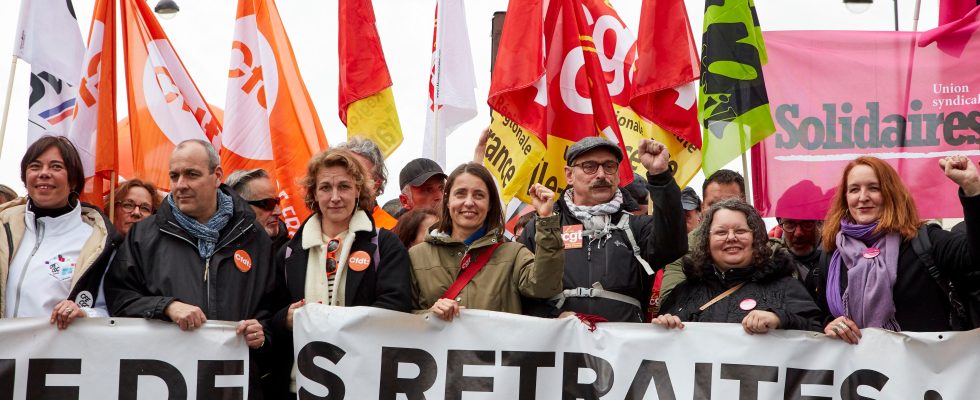It is the repeated confrontation of two certainties. On the one hand, an inflexible government, which has no intention of backing down from its desire to see its reform adopted next September, raising the legal retirement age to 64, and regrets that no compromise be proposed by the unions. On the other, social partners determined not to let a text imposed via the 49-3 procedure pass, and who castigate the attitude of Emmanuel Macron deemed hostile to any dialogue.
In this tense context, this Thursday, April 13, is the twelfth day of mobilization of the inter-union. But to see the forecasts given by the RATP, a shortness of breath seems to be gaining the ranks of the protest, at least on the side of the strikers. Traffic will be “almost normal” on the metro and RER network, while SNCF plans four out of five trains. Nearly a month after the adoption of the law, this new day of action should bring together, according to the authorities, between 400,000 and 600,000 people, twice as many as on March 7, when the Ministry of the Interior had identified 1.28 million protesters in the country. The general secretary of the CFDT, Laurent Berger, himself conceded, this Tuesday on LCIthat it was necessary “to wait until the beginning of next week” to know if the group protest movement against the reform was going to continue or not.
Eyes turned towards the Constitutional Council
This vagueness is also the result of an expectation, that of the decision of the Constitutional Council, which must render its conclusions this Friday as to whether or not the pension reform project complies with the Constitution. Several options are possible: from the total conformity of the text to its non-conformity, through a partial censorship. This last hypothesis seems the most probable. Certain points, such as the senior index or the end-of-career CDI could be withdrawn, which the government would easily accommodate, concentrated on the 64-year-old threshold.
And the unions? In the event of a green light from the Constitutional Council, a “legitimate” institution for Laurent Berger, the secretary general of the CFDT admitted that his union “would not hold demonstrations for six months”, while promising “that we will not will not have finished the episode of the pensions.” He hopes that partial censorship will encourage the President of the Republic to take up Article 10 of the Constitution, so that the text goes back through the National Assembly. But such a measure has never been publicly mentioned by the government.
However, if all the union forces no longer marched together, this would not mean that the protest stops. As proof, at the call of the waste treatment sector of the CGT, the garbage collectors of the City of Paris voted, this Wednesday, an “act 2” of the strike, after that which was held from 6 to 29 March, and which led to the accumulation of 10,000 tonnes of waste in the capital. Two weeks later, the garbage collectors promise to “transform the streets of Paris into a public dump until the withdrawal of the reform”. Similarly, the Donges refinery, near Saint-Nazaire, is calling for a 48-hour strike on Thursday and Friday. On France 24the federal secretary of Sud-Rail, Fabien Dumas, declared to him that “his union would remain available to employees who want to continue to fight”, with or without the continuation of the fight by the inter-union.
If the unions will have their eyes turned towards the Constitutional Council, it is also because its decision could “create prospects”, according to Benoit Teste, of the Unitary Trade Union Federation. By these words, he means the validation, by the Constitutional Council, of a shared referendum. But for that, it is necessary to collect 4.8 million signatures. However, the more the mobilization is reduced, the more the task looks difficult. This Wednesday, Emmanuel Macron repeated, at a press conference, his desire to “propose to all the social partners an exchange which will make it possible to initiate the follow-up” at the end of the decision of the Constitutional Council. “We have a lot of work ahead of us,” anticipates the President of the Republic.
